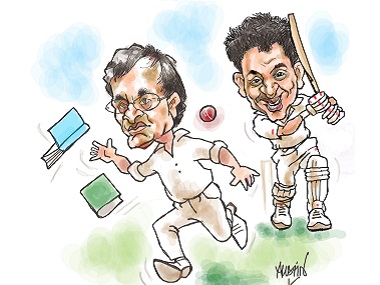Sunil Gavaskar, in his heyday, could play a stinging straight drive. I remember committing the indiscretion of placing my palm in the line of one such vicious stroke, in my follow through, in a local match long ago. The pain I felt in my hand was agonising and my fingers, I recollect, had gone numb for a few minutes.
The Li’l Master’s straight drive, in reply to prominent historian, Ramchandra Guha’s allegations of ‘conflict of interest’ and ‘superstar culture’ in Indian cricket recently, was perhaps equally, if not more, stinging.
In his resignation from the Committee of Administrators (COA) last week, the renowned historian had mentioned several contentious issues that were hurting Indian cricket. One among them, and a very prominent one, was ‘conflict of interest’.
Taking a pot-shot at the legendary opening batsman, the historian wrote in his letter, “I have repeatedly pointed to the anomaly whereby BCCI-contracted commentators simultaneously act as player agents.” Referring to a report in a prominent newspaper, of Professional Management Group (PMG) signing up Shikhar Dhawan, India’s opener, for three years, he had suggested that Gavaskar should step down from PMG completely or stop commentating for BCCI.
In reply, Gavaskar had said that he was appalled by the allegations of ‘conflict of interest’ and of his integrity being questioned. He had added that if there was a ‘superstar’ culture in cricket, there was also a ‘jealousy culture’ in the country.
Conflict of Interest
For the sake of clarity, let’s take a look at a simple definition of ‘conflict of interest’. According to businessdictionary.com, it is ‘a situation that has the potential to undermine the impartiality of a person because of the possibility of a clash between the person’s self-interest and professional interest or public interest.’
Now, the only international cricketer contracted with PMG — if we mark-down the on-and-off appearances of the talented Rishabh Pant — is Shikhar Dhawan. What Guha, therefore, meant was that Gavaskar could ‘influence’ the selection of Dhawan in the Indian squad by ‘praising’ him during his commentary stints.
Though Guha has written a couple of wonderful books on cricket, I don’t know if he realises the fact that ‘superstars’ in India can make or break careers in Indian cricket with just a phone call or even a casual mention in the media. They don’t need to be commentators!
I recollect Dilip Vengsarkar — a superstar in his own right — singing the praises of a very talented, young left-handed batsman from Bengal in the ’90s. Harking back to the turn of the millennium, I also recall a prominent coach speaking condescendingly about an ‘overhyped’ Delhi opener. Both the players later became legends of the game: Sourav Ganguly and Virendra Sehwag.
Opinions do count in sport — especially cricket. Can it be therefore conjectured that Vengsarkar was ‘promoting’ a Tata player and that the other coach was ‘promoting’ his own player in place of the ‘Nawab of Najafgarh’. Can these instances, which happen all the while, be termed as ‘conflict of interest’?
Marketing has turned sport into a product and sportspersons into commodities. India’s top cricketers — and a few from other sports — are all contracted with one agency or another. Call them ‘commodities’ if you will but these agencies help most of the players earn an income upward of Rs 100 crore a year.
A major chunk of talent in the Indian cricket team is now connected with Cornerstone Sports and Entertainment. Rohit Sharma is there — and has a vested interest in the agency — besides Virat Kohli, Ajinkya Rahane, Murali Vijay, Umesh Yadav and Ishant Sharma. Promising batsmen, Shreyas Iyer, Manan Vora and a few others are also on its list. Kohli, of course, is the only Indian in the 100 highest earning sportspersons on the Forbes list for 2017, having grossed Rs 142 crore during the year. Of this, only Rs 20 crore accrued from the BCCI coffers and the rest from endorsements.
Rhiti Sports — in which MS Dhoni was alleged to have shares — had contracts with Ravindra Jadeja, Suresh Raina, Mohammed Shami, Bhuvneshwar Kumar and K.L. Rahul. According to reports, ‘Jaddu’ is now with Baseline Ventures and Raina has moved to IOS Sports and Entertainment. Ravichandran Ashwin has signed a contract with the international agency, ITW Blitz, which promises to make him the first sportsperson from India to earn Rs 200 crore a year.
Now, let’s consider a hypothetical case of ‘conflict of interest’: Kohli decides in a particular match — and everybody knows how powerful an India skipper can be — to play Rohit Sharma and Umesh Yadav, in the eleven, instead of KL Rahul and Bhuvneshwar Kumar. The first two are contracted with the agency that Kohli is connected with and the latter belong to Rhiti Sports. Would Kohli’s integrity be questioned? I hope not!
It was reported that the Anil Kumble-Virat Kohli tiff engendered from the playing of ‘Chinaman’ Kuldeep Yadav in the Australia-India Test series. Was there ‘conflict of interest’ involved? Again, I hope not.
Anil Kumble, whether we like it or not, was the founder of a cricket software company and a sports agency named ‘Tenvic’. Before he took up the post of head-coach of Team India, he is said to have ‘completely severed’ his ties with the agency.
In Mumbai there is a new Ranji Trophy coach. The selection committee has been revamped. The committees for coaching and selection at the various age group levels too have been overhauled. One can easily draw inferences, if one were to, looking at the makeup of each of these committees as to the influence of a ‘superstar’ in these appointments. ‘Conflict of interest’? Only time will tell.
If one is hell-bent on hunting for ‘conflict of interest’ in sport it would be found in places and instances where one would least expect it to be found. Everything, of course, will depend on the colour of the glasses that one wears!
Gavaskar – Pioneer of Sports Agencies
Gavaskar played at a time when cricketers were paid peanuts. His predecessors earned Rs 750 per Test in the late 1960s and Test players got a ‘princely’ four-figure sum for a Test in the 1970s. The World Cup triumph in 1983 and the B&H Championship of Cricket win in Australia in 1985 changed the face of Indian cricket. That, combined with professional sports channels coming to India in the 1990s helped the BCCI, its administrators, players and agencies rake in the moolah.
Gavaskar, of course, was a pioneer in the sports agency business. When PMG set up shop in the 1980s, player-endorsements were rare. It was Gavaskar’s professional attitude, supported by a few other superstars, which made playing cricket for India lucrative. The present generation of cricketers — who become millionaires in a couple of years — should be grateful to those wore the India colours, with pride and little else, in the latter half of the twentieth century.
If sports superstars of today have their admirers, they have their detractors too — almost in equal proportion. India is a country of haves and have-nots. It is natural, therefore, that there is a ‘culture of jealousy’, as Gavaskar mentioned. Professionals — and non-professionals — from other spheres do envy the amount of money that players and others connected with the game of cricket make.
Kapil Dev, commenting on the money aspect of modern cricket, said recently, “A cricketer’s career can last for two years, or five years or 10 years. His future is uncertain. What’s wrong then, if he makes hay while the sun shines?”
Integrity and Character
When Gavaskar’s son, Rohan played a few ODIs for India in 2004, there were those who said that the Li’l Master had used his ‘good offices’ to push him into the squad from the East Zone. There were quite a few ‘jealous’ ex-cricketers too who said, “Didn’t I tell you?”
When Gavaskar chose to counter-attack Malcolm Marshall and Co. in the mid-1980s, there were only a few who gave him company out there in the middle. Others chose to watch from afar. He was alone when he chose to stand between a mob and persons of a ‘minority community’ during the 1993 Mumbai riots, saying, “Lynch me before you lynch them.” Where were his detractors then?
That’s why Gavaskar has the right to question those who question his integrity.
The Committee of Administrators (COA) appointed by the Supreme Court, in all its wisdom, needs to overhaul the entire cricketing system in the country, right from the grassroots level. There is ‘conflict of interest’ everywhere. Therefore, the concept of dual responsibility has to be clearly defined. Persons undermining impartiality because of their professional and personal interests need to be identified and given the option of standing down from one of those accountabilities.
In that local match I had mentioned earlier, I bowled a bouncer to Gavaskar, which swung in and took him by surprise. The ball brushed past his gloves, as he defended, and hit him smack above the ear, rebounding just short of the forward short-leg fielder. When I showed disappointment at the dropped catch, the legendary opening batsman smiled at me sheepishly.
The Li’l Master had faced the best fast bowlers in the world. But when a local medium-pacer had him fending off a bouncer, he didn’t stare back. He smiled. That for me is a person with high self-esteem and ‘character’!
The author is a former fast bowler, and cricket and football administrator, besides being a caricaturist and sportswriter


)




)
)
)
)
)
)
)
)